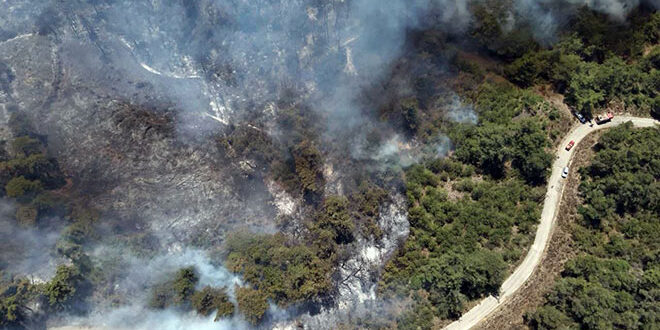Continuation of Efforts to Extinguish Fires in Northern Latakia Countryside with International Cooperation and Logistical Support

Firefighting and civil defense teams continue their efforts for the fifth consecutive day to control the fires raging in the northern countryside of Latakia, with limited progress in extinguishing some hotspots, and efforts being reinforced with international support from Turkey, Jordan, and Lebanon, in addition to local reinforcements.
Abdul Kafi Kayal, the director of civil defense in the Syrian coast, confirmed in a statement to SANA that the firefighting teams are making progress in controlling some fire hotspots, noting the cooperation of Turkish and Jordanian teams to prevent the spread of fire to new green areas.
Kayal explained that the fires are still active in three main areas: Ras al-Basit, Qastal Ma'af, and Rabiya, with efforts focused on preventing them from reaching the Kassab district, which houses the largest forest reserve in Syria. He added that coordination is ongoing with all parties to provide support with equipment and personnel.
On the other hand, the Syrian Civil Defense mentioned on Telegram that local and Turkish firefighting teams made significant efforts during the past night to control the fires in Jabal Turkman and the Firinlik forests, where the fires spread in steep valleys, and the teams faced difficulties due to strong winds, dense forests, and rugged terrain.
As part of regional support, Lebanon allocated two firefighting helicopters, which are expected to start operations today, Monday, while Turkey and Jordan continue to provide support through ground teams and firefighting aircraft.
The Syrian Ministry of Interior announced the deployment of additional human and logistical reinforcements to the area, in coordination with the Ministry of Emergencies and Disasters, to enhance firefighting efforts and protect civilians and the environment.
The fires have damaged more than 10,000 hectares of land in the worst wave of fires the region has witnessed, amid challenges such as harsh weather conditions, the presence of mines, and the absence of fire lines.
The Ministry of Social Affairs and Labor has set up an emergency room to monitor the situation of displaced persons and affected individuals, while UN teams have conducted an urgent assessment of humanitarian needs, according to Adam Abdul Mawla, the UN Humanitarian Coordinator in Syria, who confirmed the organization's readiness to deploy a joint mission to support local efforts.
More than 80 firefighting teams and 180 vehicles are still operating in the field within a joint operations room involving local and military authorities, in addition to volunteers and residents, in an attempt to control the ongoing environmental disaster.